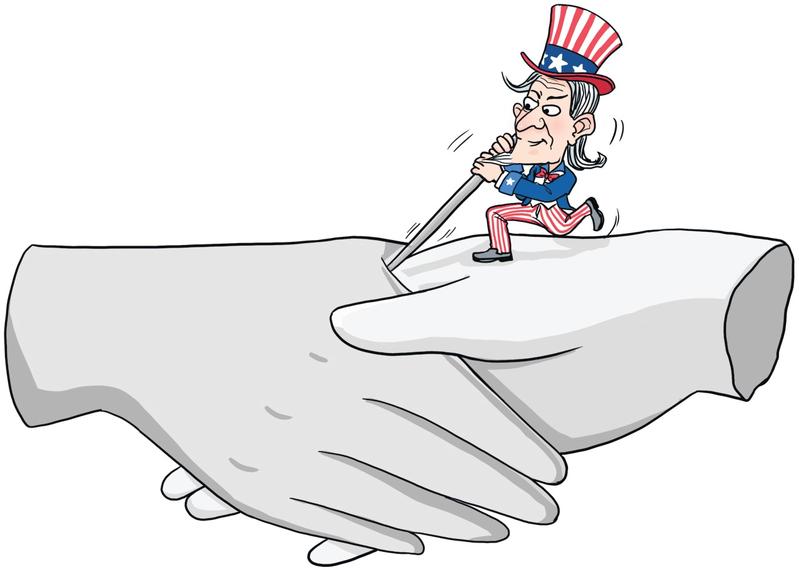 (SHI YU / CHINA DAILY)
(SHI YU / CHINA DAILY)
With rising Sino-US tensions, the United States administration has been hyping up the "China threat" theory in a bid to build a US-led anti-China alliance. What the US administration doesn't understand is that other countries have few reasons to take its side.
US Secretary of State Mike Pompeo, during his visit to the Czech Republic, Slovenia, Austria and Poland from Aug 11 to 15, tried to recall the memories of the Cold War to prompt those countries to oppose China and Russia, but his ploy but did not work.
Since the Central and Eastern European countries suffered from superpower geopolitics during the Cold War, they tend to avoid getting involved in other countries' games. Although depending, to a certain extent, on the North Atlantic Treaty Organization for their national security, the CEE countries balance their diplomatic ties and cooperation with the US, the European Union, Russia, China and other economies.
Without apparently being sincere about supplying public goods and engaging in win-win cooperation, the US has been trying to use the CEE countries as tools to restrain China and counterbalance the EU's influence. Conscious about their independence and sovereignty, the CEE countries do not want to be manipulated into supporting the US idea of a new Cold War.
To drive a wedge between China and the CEE countries, the US administration's use of new tricks to show China and Russia pose a serious security threat to them will not work, although it cajoled Poland into negotiating the Enhanced Defense Cooperation Agreement. For if the CEE countries ban Chinese telecom giant Huawei's 5G technology and equipment, Washington cannot help them address their consequent problems or fulfill their telecom needs.
Besides, due to its unilateral and trade protectionist policies, Washington has been isolating itself from the international community. Despite being a US ally, the European Union has criticized the US administration's unilateral and irresponsible actions in international issues.
Washington has also received enough flak for interfering in the cooperation between Russia and European countries by beefing up its military presence in the CEE countries and creating obstacles to the Nord Stream 2 gas pipeline from Russia to Europe.
The CEE countries don't want to weaken their cooperation with China because China adheres to the policy of openness, equality and mutual benefit. Besides, the"17+1" (16 CEE countries and Greece plus China) platform for trade between China and the CEE countries provides huge cooperation opportunities.
Cooperation under the"17+1" framework helped the 17 European countries build infrastructure which boosted their economies. These infrastructure projects include the north-south highway in Montenegro, the Stanari Thermal Power Plant in northern Bosnia and Herzegovina, the Mihajlo Pupin Bridge and Smederevo Steel Mill in Serbia, the Peresac Bridge project in Croatia, and the Piraeus port in Greece.
The"17+1" framework has also helped boost bilateral policy coordination, cooperation mechanisms, trade, and people-to-people exchanges. And as China's economic strength grows, cooperation with the CEE countries will further strengthen.
In 2019, China's overall trade under the"17+1" framework increased 6.9 percent year-on-year. And in the first six months of 2020, freight trips between China and Europe increased 36 percent year-on-year, and cargo shipment rose 41 percent to 461,000 twenty-foot equivalent units, which shows China-CEE cooperation is deepening.
Pompeo's recent visit to the Czech Republic, Slovenia, Austria and Poland, in a way, is an acknowledgment of the great potential of trade between China and the 17 European countries. Therefore, the two sides should further deepen their practical cooperation and prevent any third-party interference.
China and the CEE countries can deepen cooperation in various fields, by strengthening dialogue with the EU to jointly safeguard multilateralism. And by signing bilateral investment treaties under the"17+1" framework, they can elevate the scale and level of bilateral trade.
But since CEE countries have not only similarities but also diversities, China should pay attention to the specific concerns and demands of each CEE country, formulating cooperation plans based on both common interests and specifics, and by following the "one policy for one country" principle.
And more open dialogue is needed to address the problems in China-CEE cooperation, to promote bilateral trust and understanding, and determine China's investment capacity. Also, China can increase the import of high-quality products from the CEE countries to reduce bilateral trade deficits.
The two sides should also make better use of the connectivity advantage to push forward the construction of foreign economic and trade cooperation zones. On its part, China should continue research and investment in CEE countries' infrastructure, emerging industries, and new energy projects, while expanding people-to-people and cultural exchanges, and taking measures to ensure cooperation under the "17+1" framework benefits the local people.
The author is a research fellow at the Institute of Russian, Eastern European&Central Asian Studies, Chinese Academy of Social Sciences.
The views don't necessarily represent those of China Daily.


